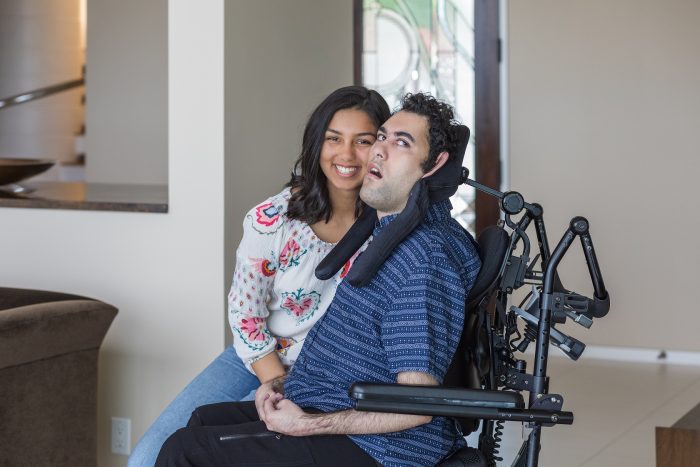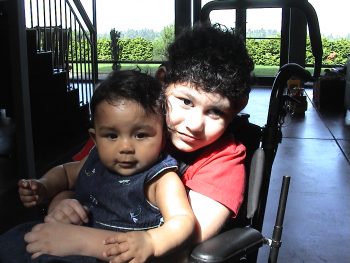Tara Shares a Message of Inclusion
1.8.2020 | Tara Nadella

Nadella shares her personal experience as the sibling of a patient at Seattle Children’s and explains why she approaches life with a lens of inclusion.
Updated March 4, 2022: Thank you to our community of donors for your outpouring of sympathy, support and interest in celebrating the life of patient Zain Nadella, who recently passed away. Zain was the beloved son of Anu and Satya Nadella, and as a long-time patient, the family considered Seattle Children’s a second home.
We are holding the family in our hearts. Memorial gifts can be sent to Seattle Children’s, and donations will support programs the Nadellas are passionate about, including precision medicine neurosciences, cerebral palsy care and research, mental healthcare, neonatal intensive care and equitable access to care.
I’m 17 and a senior in high school. Family time is important to me, especially with my siblings! When my brother, Zain, and I spend time together, we usually listen to music or go to the movies.
Pretty ordinary sibling stuff, but what makes our story particularly unique is the fact that Zain has cerebral palsy.
Zain is 23 and has been a patient at Seattle Children’s for his entire life – so we see the hospital as a second home. We’ve spent a lot of time there, including holidays like Thanksgiving and Easter.
Last year, Zain was in the intensive care unit for his birthday, so we brought the party to him — taking turns visiting his room and singing. The staff was so gracious about everything, and we were able to bring joy to Zain even though he was in a hospital bed.
From my first taste of onion rings in the cafeteria as a child to understanding how to care for my brother today, this hospital has been a partner on our journey. All children and families deserve the exceptional care we’ve been so fortunate to receive at Seattle Children’s.
My brother is a teacher of inclusion
 Zain has cerebral palsy and communicates nonverbally — so to ensure his own inclusion in our family and society, he has taught us in his own way the importance of fostering everyday inclusivity.
Zain has cerebral palsy and communicates nonverbally — so to ensure his own inclusion in our family and society, he has taught us in his own way the importance of fostering everyday inclusivity.
Despite the obstacles he faces, I see how hard Zain works to include us in his daily life: vocalizing music requests, grinning when our grandparents call and delightedly receiving licks from our pups. His own efforts to be a self-advocate have taught those of us that love him how to be advocates for inclusion on his behalf.
Zain’s lessons have made me passionate about ensuring that every voice is heard and respected, because a quieter voice isn’t a lesser voice.
Zain’s musical preferences span many genres! He listens to everything from Abba to Enya to Leonard Cohen to Pavarotti. He conveys that he likes a song with sunny smiles and little laughs, but if he wants something else, he’s quick to let us know!
The staff, nurses and doctors at Seattle Children’s embody a compassionate, respectful understanding of my brother’s rights. They also teach young advocates like me by example, showing how leadership in inclusiveness is fundamental for making a change towards greater acceptance.
Whenever possible, I talk with people about the importance of cultivating inclusion. I use the personal experiences that have given me a unique perspective to try to share and inform others.
For example, when I’m walking down the hallway at school and I hear people say things like, “You’re such a spaz!” or “Are you blind?” I try to help them see the impact of their words to promote the use of more inclusive language.
When people meet Zain for the first time, they often ask me friendly questions about him. In these instances, I’ll encourage them to direct their questions to Zain – hopefully empowering Zain to be a more active participant in society.
I’ve never had to explain this to anyone on Zain’s care team at Seattle Children’s because seeing everyone as individuals with their own stories and a past, present, and future is an intrinsic part of the hospital’s culture.
My next steps in nurturing everyday inclusivity
 I have learned from my brother that our voices can be a powerful tool to help support one another. If we all raise our voices together, we can achieve a great many things to create a better tomorrow of greater inclusion and acceptance.
I have learned from my brother that our voices can be a powerful tool to help support one another. If we all raise our voices together, we can achieve a great many things to create a better tomorrow of greater inclusion and acceptance.
We all have our own individual narratives, but they all need to be recognized equally. My brother Zain is more than a medical profile. He is an individual with passions and frustrations and a proud voice to share — if we all remember to listen.
Seattle Children’s has taught me about inclusion by the example they set. From the security staff who look Zain in the eye as they greet him to the music therapists that can light up any intensive care unit room, the hardworking and dedicated team at Seattle Children’s has given me a strong model of inclusion that I will advance throughout my life.
This is why Seattle Children’s will have a special place in my heart forever.
Through breakthrough research, compassionate care, and support from generous people like you, Seattle Children’s can envision a day when we can say yes to hope, care and cure for every child.
